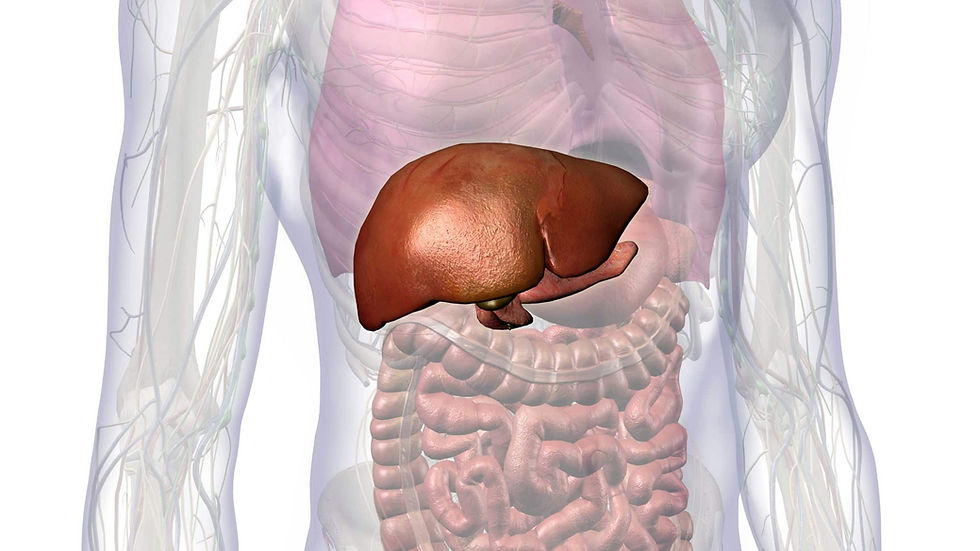Your liver- why and how to take care of it?
- Katrin Peo
- Jul 12, 2020
- 4 min read
Updated: Sep 18, 2025
Did you know that your liver is the largest solid internal organ in your body- about the size of a football and weighing between 1.36-1.59 kilograms (47-56 oz)? Did you also know that your liver performs more than 500 functions in your body and healthy liver filters around 1.7l blood every minute?

Liver is the only organ in the body which has the ability to grow cells and regenerate itself. It can be split in half and transplanted into another human being. When portion of your liver is removed, the portion than remains in the body is able to regenerate itself to nearly its original size- though not the same shape. While as per some studies you can live with only 25 to 30 percent of your liver, you would die without it as without your liver:
different chemicals, toxins and digestive byproducts will build up in the blood
your blood will not clot, which causes uncontrolled bleeding
you will have less defence against fungal and bacterial infections
On the other hand if you take care of your liver, you'll have:
Improved energy levels
Sharper mind and a positive mood
Better oral health and fresher breath
Clearer skin
Fewer infections in your body and stronger immune system
Less digestive issues and more regular bowel movements
Regular menstrual cycle with reduced PMS
What are the main functions of your liver?
communicates with other digestive organs, receiving information about the level of available nutrients or the presence of threats like toxic substances, heavy metals and prescription medications
helps to eliminate pesticides, drugs and caffeine from the blood
manages the conversion of fats from your diet and manufactures triglycerides and cholesterol
helps to make, convert, neutralise and eliminate hormones
helps to spread nutrients throughout the body via the bloodstream and keeps the amount of nutrients in the blood supply at optimal levels
converts vitamins to their active form and stores for later use
removes excess histamine from the body
manages our energy levels
supports our metabolism
Takes the carbohydrates you consume from your food and turns them into glucose, a form of energy, to be stored for later use
manages our blood sugar levels
produces bile
What are the symptoms of a sluggish liver or a liver disease?
abdominal pain (liver damage causes pain in the centre or right upper part of the belly; if the liver becomes swollen, the pain will also extend across the abdomen and down toward the belly.)
bloating and constipation
nausea and vomiting
sluggish energy and always feeling tired
chronic infections
brain fog and trouble concentrating
headaches, including migraines
skin issues, eczema
hormonal issues with irregular periods in women (where for example your oestrogen is much higher than your progesterone and since liver helps to break down oestrogen and eliminate via your gut, it's important to have your liver working properly so excess oestrogen can be eliminated by the body)
jaundice (yellowing of your skin)
dark urine
excessive sweating
mood swings
etc
What can cause a sluggish liver or liver damage?
Consuming too much alcohol
Prescription drugs or antibiotic use
High stress levels and hormonal imbalances
Air pollution and therefore environmental toxin exposure
Exposure to chemically sprayed crops (fruits, vegetables, grains)
Unprotected sex that spreads viruses/infections
Using chemical household and beauty products
Autoimmune or inherited liver disease
Obesity (due to eating many packaged foods that contain high amounts of sugar and refined oils)
Avoid:
Heavy drinking, too much alcohol and too much caffeine
Packaged ultra-processed foods with refined oils, sweeteners, artificial colours
Refined grains
Fruits and vegetables sprayed with chemicals pesticides and herbicides
Factory farmed animal products and fish
How can you support your liver so it actually functions at its full capacity?
Consume an anti-inflammatory diet and choose organic wherever possible.
The best foods to consume for your liver:
Bitter greens (rucola, dandelion, chicory, mustard greens, collards, Swiss chard) prior the main meals
Sour foods (great way to start your day with a couple slices of lemon in a big glass of water), but also lime, grapefruit
Garlic
Leafy greens and grass (spinach, chlorella, barley or wheat grass)
Fresh herbs (parsley, coriander, turmeric, oregano)
Broccoli sprouts
Cruciferous vegetables (cauliflower, broccoli, kale, Brussel sprouts)
Beetroot
Avocados
Globe artichokes
Anti-oxidant rich foods (berries (like blueberries, cranberries)
Coconut oil
Green tea (such as Matcha tea)
Probiotic foods (fermented vegetables, kombucha, kefir)
Raw local honey
Turmeric
Supplements great for your liver:
Dandelion root (in capsule and tea form)- helps balance fluid levels in the body and boosts the liver’s function to quickly eliminate toxins, helping with blood sugar levels, relieving indigestion and strengthening the immune system
Milk thistle- great source for antioxidant called silymarin, which prevents the depletion of glutathione (a very important body's antioxidant) in the liver
Liquorice root - liquorice root extract has anti-inflammatory properties and can help soothe gastrointestinal problems.
Holy basil (also known as Tulsi)
Schisandra
Burdock root
In addition reduce your stress levels, exercise regularly and get adequate amounts of sleep to keep your liver healthy.
If you need help and guidance around your health challenges, want to improve your nutrition, don't hesitate to reach out to me for health coaching and nutrition counselling at info@katrinpeo.com.






Comments